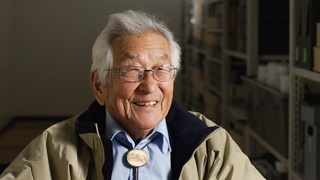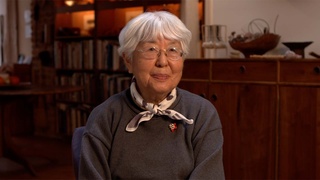Interviews
Being called out of Reserves
After George and I got to where we were working and we worked there, like I mentioned, Frank had come out with his family. He said, “If you don’t like where you’re working, there’s plenty of work in Chicago if you want to work there.” Being in the city, it seemed to be better. So we went to Chicago and worked there.
That was the middle of summer, and I think it was about October. They called me up and they called George. They had pulled us out of the Reserves. By that time, they had the 442 and they had the 100 Battalion pretty well organized. They could have been in Africa by 1944. Because the war ended in ’45.
We still hadn’t taken our basic training. Before I took my basic training, or when I was called up in Chicago, they said, “Do you have choice of where you want to serve in the army?” I said, “Yes, I’ll volunteer to be in Military Intelligence school.” And they said “Fine.”
George was inducted and he didn’t care where he went, so that’s why they send him down to Florida. And they took a basic training, and he was signed to go to replacement for 442. But by then, by then the war was over in Europe.
Date: February 6, 2015
Location: California, US
Interviewer: John Esaki
Contributed by: Watase Media Arts Center, Japanese American National Museum
Explore More Videos

Invited to teach at Harvard by his boss
(1919 - 2015) Nisei who served in World War II with the 442nd Regimental Combat Team

The Dopey bank that survived the war
(b. 1934) Award-winning Disney animation artist who was incarcerated at Topaz during WWII

Evacuated to the Jungle
(b. 1938) Philipines-born hikiagesha who later migrated to the United States.

Captured by Guerillas after bombing of Pearl Harbor
(b. 1938) Philipines-born hikiagesha who later migrated to the United States.

Grandfather picked up by US Army
(b. 1952) Former banking executive, born in Hawaii

Father's business partner operated their farming business during WWII
(b. 1935) Sansei businessman.

Father was convinced the constitution would protect him
(b. 1935) Sansei businessman.

The lack of discussion about family’s incarceration in Amache
Sansei judge for the Superior Court of Los Angeles County in California


Her brother’s reasons as a No-No Boy
(b. 1923) Japanese American poet, activist

Her grandfather was pressured to teach Japanese
Sansei judge on the Superior Court of Los Angeles County in California

Neighbor took care of her mother after grandfather was taken by FBI
Sansei judge on the Superior Court of Los Angeles County in California

Immediately after the bombing
(b. 1938) Japanese American. Hiroshima atomic bomb survivor

Other family members not as lucky
(b. 1938) Japanese American. Hiroshima atomic bomb survivor

His parents had little hope that he had survived the atomic bomb
(b. 1938) Japanese American. Hiroshima atomic bomb survivor
